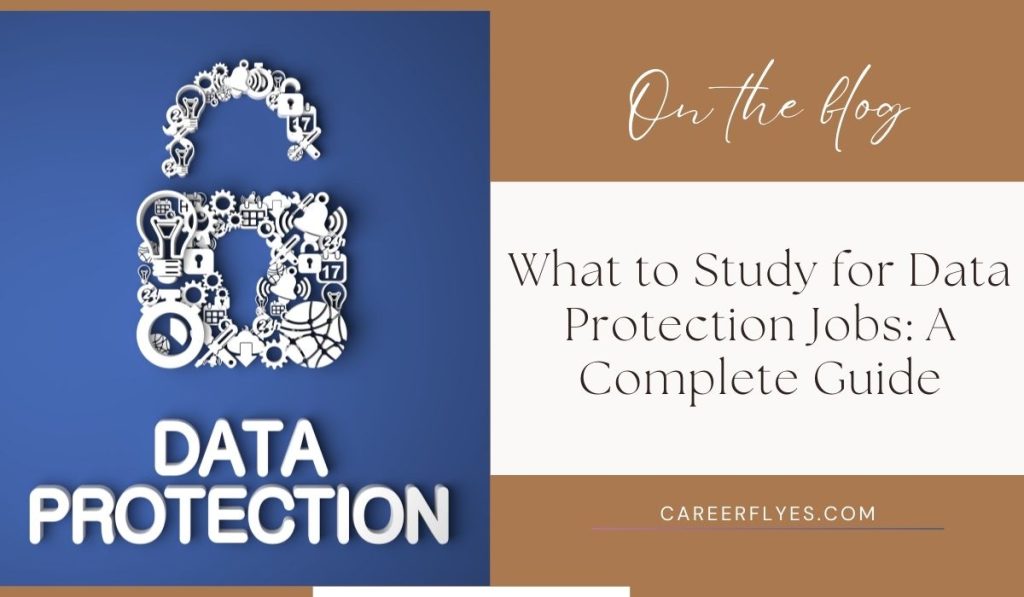What to Study for Data Protection Jobs: A Complete Guide
6 min read
As organizations increasingly rely on digital data, the need for professionals who can protect sensitive information has surged. Data protection jobs are in high demand, especially as companies face growing regulations like GDPR (General Data Protection Regulation) and CCPA (California Consumer Privacy Act). This guide will cover what you need to study and the skills you need to succeed in data protection careers.
Understanding Data Protection and Its Importance

Data protection refers to practices and technologies that secure personal, financial, and confidential data against theft, loss, or unauthorized use. Professionals in this field work to implement policies and systems that ensure data remains private and complies with regulatory standards like GDPR (General Data Protection Regulation) and CCPA (California Consumer Privacy Act). With data breaches becoming increasingly common, companies are in high demand for skilled data protection professionals to keep their data and reputations safe.
Key Subjects to Study for Data Protection Jobs
To build a strong foundation in data protection, focus on these core subjects:
1. Cybersecurity Basics
Understanding cybersecurity is essential, as data protection is a subset of the broader field. Cybersecurity covers the fundamental principles of defending computers, networks, and data from attacks. Topics to study include:
- Threats and Vulnerabilities: Recognize common threats like malware, phishing, and ransomware.
- Network Security: Learn about firewalls, intrusion detection systems (IDS), and virtual private networks (VPNs).
- Encryption: Study encryption methods, such as AES and RSA, that protect data during transmission and storage.
Studying these areas will provide the foundational knowledge to understand data protection within the larger cybersecurity landscape.
2. Privacy Laws and Regulations
Data protection jobs often require a thorough understanding of privacy laws that govern how data is handled and stored. Major regulations include:
- General Data Protection Regulation (GDPR): This European law sets strict rules on data privacy and security.
- California Consumer Privacy Act (CCPA): Protects the privacy rights of consumers in California.
- Health Insurance Portability and Accountability Act (HIPAA): Applies to healthcare data, ensuring sensitive patient information is handled securely.
Being well-versed in these regulations allows data protection professionals to ensure their organizations remain compliant, avoiding costly fines and breaches of trust.
3. Risk Assessment and Management
Risk assessment is the process of identifying and evaluating potential threats to data security, often visualized using an influence diagram to map risks and their impact. Understanding how to assess and manage risks is critical for data protection:
- Risk Identification: Learn how to pinpoint vulnerabilities within an organization’s data infrastructure.
- Risk Analysis: Study methods for analyzing the probability and impact of risks.
- Mitigation Strategies: Develop skills to recommend measures, such as installing security patches or improving access controls, to reduce risk.
Training in risk management will help you create a proactive approach to data protection, focusing on prevention as well as response.
4. Data Governance and Compliance

Data governance involves managing the availability, usability, and security of data. Compliance refers to following industry standards and legal requirements. Topics to explore include:
- Data Governance Frameworks: Learn about frameworks like DAMA (Data Management Association) that guide data handling.
- Data Lifecycle Management: Study how data is stored, archived, and eventually deleted securely.
- Audit and Compliance: Understand how to conduct audits and maintain records to prove compliance with data regulations.
Mastering these areas is essential for implementing effective data governance policies within any organization.
5. Technical Skills in Data Security
In data protection jobs, technical skills are often necessary to implement security measures effectively. Important technical areas include:
- Database Security: Understand how to secure databases against unauthorized access and ensure data integrity.
- Access Control: Learn about Role-Based Access Control (RBAC) and other methods to restrict data access.
- Security Information and Event Management (SIEM): Study tools like Splunk or IBM QRadar that help monitor and manage security data in real-time.
These technical skills will help you actively secure data and identify security incidents as they occur.
Recommended Certifications for Data Protection Jobs
Earning certifications is a great way to strengthen your skills and demonstrate expertise in data protection. Here are some highly regarded certifications:
- Certified Information Privacy Professional (CIPP): Offered by the International Association of Privacy Professionals (IAPP), the CIPP is a popular certification that covers data privacy laws and practices.
- Certified Information Security Manager (CISM): Provided by ISACA, this certification focuses on information security management and risk assessment, essential skills for data protection roles.
- Certified Data Privacy Solutions Engineer (CDPSE): This certification by ISACA targets professionals who implement privacy solutions, covering privacy laws, governance, and data lifecycle management.
- Certified Ethical Hacker (CEH): The CEH certification is ideal for learning how to identify vulnerabilities and potential security risks, a valuable skill for data protection jobs.
These certifications not only build relevant skills but also enhance your resume, making you a strong candidate for data protection roles.
Important Skills for Data Protection Careers

In addition to technical knowledge, soft skills are equally valuable in data protection jobs. These include:
- Attention to Detail: Data protection requires meticulous attention to policy details and risk factors.
- Communication Skills: Often, data protection professionals need to communicate risks and security policies to non-technical staff.
- Problem-Solving: Quick and effective problem-solving skills are essential when responding to security incidents.
Developing these soft skills can improve your performance and help you collaborate effectively with colleagues across various departments.
Career Paths and Job Roles in Data Protection
There are various roles in data protection, ranging from entry-level to advanced positions:
- Data Protection Officer (DPO): Many companies now employ DPOs to oversee data protection efforts, especially in GDPR-compliant regions.
- Information Security Analyst: Focuses on monitoring and addressing security breaches.
- Compliance Officer: Ensures that the company’s data practices meet all regulatory requirements.
- Data Privacy Consultant: Provides specialized advice on data protection laws and policies.
Each role involves different aspects of data protection, allowing professionals to choose positions that align with their interests and skill sets.
The Future of Data Protection Jobs
The demand for data protection professionals is expected to grow as data privacy laws become stricter and companies prioritize data security. Opportunities exist across industries, from tech companies to government agencies. Additionally, the rise in remote work has increased the need for secure data handling practices, further boosting demand in this field.
Roles in data protection may also expand into new areas, like artificial intelligence and machine learning, as these technologies become more widely used. Staying current with industry developments and upgrading your skills will be essential for long-term success in data protection careers.
Frequently Asked Questions About Data Protection Jobs
Q: Is a degree necessary for a data protection job?
A: While a degree in computer science, information technology, or a related field is often helpful, some positions may be open to candidates with relevant certifications and experience.
Q: What is the salary range for data protection roles?
A: Salaries vary depending on the level of expertise, with entry-level positions starting around $60,000 annually and advanced roles like Data Protection Officers earning upwards of $100,000.
Q: Are data protection jobs only available in tech companies?
A: No, data protection jobs are available in many sectors, including finance, healthcare, retail, and government, as these industries also handle sensitive data.
Conclusion
Preparing for a data protection job involves a mix of studying key subjects, gaining relevant certifications, and developing essential skills. A career in data protection is both challenging and rewarding, as it plays a vital role in protecting sensitive information and ensuring regulatory compliance. With growing demand and diverse opportunities, now is a great time to pursue a data protection career. If this guide helped clarify what to study for data protection jobs, please share it with others or leave a comment with your thoughts!


